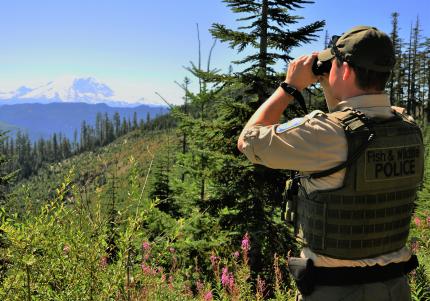For statewide Enforcement related questions or to report a violation or dangerous wildlife please contact the WILDCOMM Communications Center at WILDCOMM@dfw.wa.gov or 360-902-2936 Option 1

The mission of the Washington Department of Fish and Wildlife Enforcement Program is to protect our natural resources and the public we serve.
With more than 160 commissioned law enforcement personnel around the state, the Washington Department of Fish and Wildlife Police enforce laws and regulations related to human-wildlife conflict, hunting and fishing, and the protection of fish, wildlife and habitats.
WDFW officers conduct law enforcement in state and federal waters, parks, and forest lands. Our unique capabilities, assets, and jurisdiction mean our officers also respond to public safety issues such as dangerous wildlife encounters, natural disasters, and search-and-rescue operations.
In addition to enforcing all Washington State fish and wildlife rules and regulations, WDFW officers also assist city and county law enforcement agencies, tribal authorities, and federal agencies. We enforce federal laws, Oregon state statutes, and county ordinances through memorandums of agreement.
The WDFW Enforcement program is primarily responsible for enforcing Title 77, the Fish and Wildlife Code. WDFW Officers are general authority peace officers and enforce all criminal laws, including traffic violations, drugs, and warrants for arrest.
Officers also hold federal U.S. Fish and Wildlife and National Marine Fisheries Service commissions, and have jurisdiction over federal violations, the most important of which are the Endangered Species Act and the Lacey Act. Officers collaborate and coordinate with these agencies and the U.S. Coast Guard.
On average, officers make more than 225,000 enforcement contacts annually.
-
Become a WDFW officer
See what it takes to become a part of the WDFW Enforcement team.
-
Report a violation
See something? Say something. Turn in a poacher or report a violation directly to WDFW Police.
-
Wildlife trafficking in Washington
WDFW plays a key role in preventing wildlife trafficking worldwide.
-
Claim property and evidence
Find out about property seized by WDFW officers.
-
Contact WDFW enforcement
Find contact information for Customer Service, Evidence and Records, Administration, and more.
-
Officer complaint or commendation
The WDFW Enforcement Program is committed to providing high-quality police services. Constructive comments will help us improve our delivery of service and achieve our goals.
-
Nonlethal Pursuit Pass Program
The Nonlethal Pursuit Training Program was enacted to help keep dogs trained for enforcement response to wildlife conflicts.